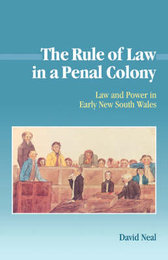
|
The Rule of Law in a Penal Colony: Law and Politics in Early New South Wales
Hardback
Main Details
| Title |
The Rule of Law in a Penal Colony: Law and Politics in Early New South Wales
|
| Authors and Contributors |
By (author) David Neal
|
| Series | Studies in Australian History |
|---|
| Physical Properties |
| Format:Hardback | | Pages:284 | | Dimensions(mm): Height 216,Width 140 |
|
| Category/Genre | Australia, New Zealand & Pacific history |
|---|
| ISBN/Barcode |
9780521372640
|
| Classifications | Dewey:345.944 |
|---|
| Audience | | Professional & Vocational | |
|---|
|
Publishing Details |
| Publisher |
Cambridge University Press
|
| Imprint |
Cambridge University Press
|
| Publication Date |
31 January 1992 |
| Publication Country |
United Kingdom
|
Description
Ironically, the first civil case to be heard in Australia occurred at the behest of two convicts under sentence. Of course, convicts had first-hand experience of criminal law, but all the settlers were part of a culture which emphasised the rule of law as the guarantee of its fundamental political value, British liberty. This book, written by a lawyer and unique for its perspective based in both legal and social history, illuminates the important role played by the concept of the rule of law in the transformation of New South Wales from a penal colony to a free society. Dr Neal lucidly outlines the interaction between law and politics in early New South Wales and shows that because there were no official political structures, the courts served as a de facto parliament and a means of political expression.
Reviews"The early history (1788 to 1842) of New South Wales was dominated by its designation as a place for 'transported felons'--forgers, embezzlers, burglars, revolutionaries, and prostitutes--who mercifully escaped the hangman's noose in England. Here is an extremely interesting account of its growth from the legal perspective and of the development of a system of magistracy, courts, and police...An excellent study, well written, well documented..." Choice "This book is an important contribution to our understanding of the role of law in Australian history." Bruce Kercher, Law and History Review
|